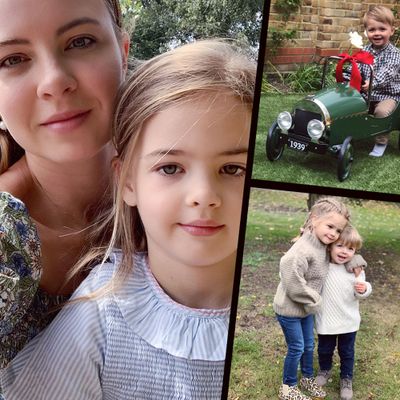
My Journey Into Motherhood: Alice Edwards
Just before we got married, I found out I had endometriosis. I also have Crohn’s disease so we decided to start trying pretty quickly. A few weeks after we got back from honeymoon, I had an operation to make a successful pregnancy more likely.
We were thrilled when our daughter Honor arrived just before our first wedding anniversary. Throughout both of my pregnancies, I was closely monitored, with scans every few weeks. Thankfully, with the exception of extreme morning sickness during the first trimester, I had a pretty easy ride.
The second time around felt more familiar. Only this time, in my third trimester, I experienced something called a hemiplegic migraine, which essentially mirrors a stroke. The first time it happened I was at my desk at The Sunday Times Style magazine, utterly terrified and confused. My deputy editor managed to reunite me with my husband who worked next door and we headed to hospital. Several hours later I received the diagnosis. I had two more attacks before my son arrived, but haven’t had one since. That’s the extraordinary thing about pregnancy hormones…
My birth plan for my first labour had been as brief as possible. All I wanted was to deliver a healthy baby and ideally not let my husband near the ‘business end'. Both my labours were pretty long and both times I was induced. The first time I got pretty close to needing an emergency C-section, which was something my doctors desperately wanted to avoid – having had abdominal surgery for Crohn’s disease, this could have caused further complications. Luckily, at the eleventh hour Honor made her entrance.
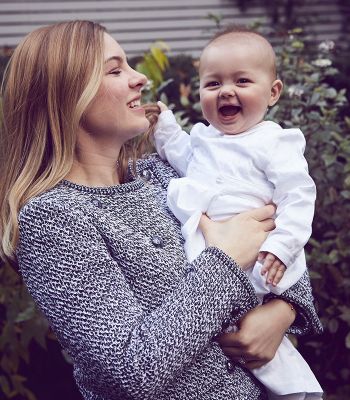
Our son was much speedier. In fact, Kit arrived almost a month early, leaving us entirely unprepared. As a result, he spent several days in the NICU while his lungs matured. Never have I been more grateful for the NHS and its extraordinary work. A week later we came home to begin life as a family of four.
Those first few days with a newborn are utterly discombobulating. The first few months are too. When I became a mother for the first time, very few of my friends had children; having lost my own mother when I was 17, I felt really quite isolated and lost. As the presents, flowers and visitors poured in, I didn’t know what time it was or even what day. I found I hadn’t much clue about how to manage this new responsibility, let alone any practical information around feeding or sleep. Compared to Honor, the first few weeks of life with my son were like night and day. I spent the first six weeks of his life bathed in his new-born glow, living every new-parent cliché imaginable.
Looking back, it’s easy to see I had post-natal depression following Honor’s birth. Simple tasks, like getting dressed or making coffee, felt insurmountable. It was considerably worse in the day; by the time my husband came home, I had managed to convince myself the morning’s darkness was simply a figment of my imagination. But as dawn broke, the cycle would start over. This pattern rumbled along for months, but it gradually improved enough for me to feel normal again.
It wasn’t as bad with my son, at first. It was all going well until a 24-hour bout of food poisoning prompted the post-natal depression (PND) to return within a matter of days. This time the contrast in my mood and behaviour was so stark it was impossible to go undetected. I was quickly prescribed a drug called sertraline which, once I had the correct dosage and it settled with my hormones, helped the dark clouds to dissipate. I don’t know why I suffered from PND, but it wasn’t something I could have overcome alone. My husband showed me unbelievable support, which was totally devoid of judgement. My father and stepmother were equally supportive, and told me never to apologise or be ashamed of my mental health.
I’m sure my grief played a role in having PND. It’s something I’ve had to find a way to live with. My brother wrote once that when our mother and sister died, a part of him died too, but in that place they live on. When I feel desolate, I try to let their love and their memories fill that space until I feel strong enough to move on with my day. The circle of life can be utterly brutal, but the world never stops turning. We just have to find a way to put one foot in front of the other. My son looks so much like my mother, and definitely has my sister’s cheeky side. My daughter has their empathy and kindness – I’ve never known a more generous five-year-old.
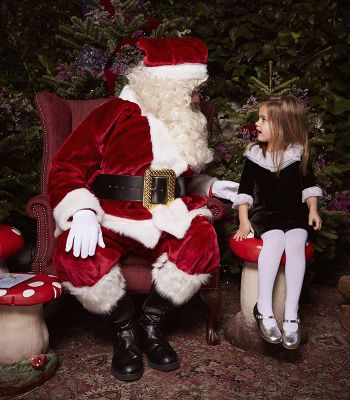
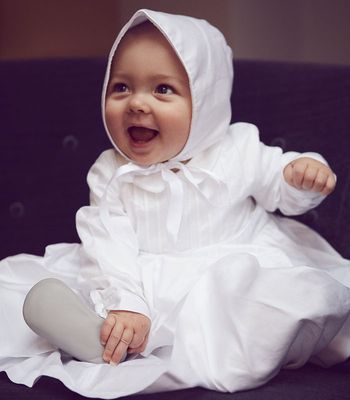
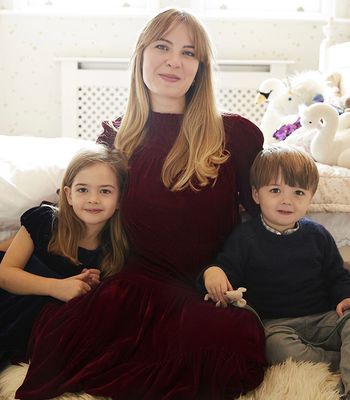
With my daughter, I ended up taking a seven-month maternity leave. The second time, I filed an article for The Times from my hospital room. As my son arrived early, I hadn’t formally started maternity leave! From there, I took a few weeks off before doing some ‘keeping in touch’ days and meetings. It was just a few hours a week, but it really helped bring some structure into my life and give me a focus outside of motherhood. Luckily, I had two extremely sympathetic editors with whom I was totally honest. As a result, both of them encouraged me to do what I felt comfortable with.
I’m still finding my way as a parent and perhaps I always will be. On a practical level, I’m now incapable of watching any film or television show that might have a plotline which endangers, jeopardises or harms children in any way, however minor. It’s a constant source of irritation for my husband and, after discounting endless shows on Netflix, he often resorts to just putting on Friends – again.
As a parent, I’m more confident about listening to my own intuition. That said, having two wildly different children means I often feel like I have to be two different kinds of mother. Their needs and temperaments are occasionally polar opposites and I’m constantly learning to vary my approach.
Parenthood has also taught me to have more patience. Things I couldn’t have even conceived of being contentious – like putting on socks, or how a piece of fruit is cut up – can be wrestled over for hours. With each day, I’m honing my patience, and I’m always reminding myself to dig deeper.
For me, selflessness is one of the hardest parts of being a mother. It’s definitely something I have to work at. Practically, I have no problem putting my children and their needs first – in fact, it comes totally naturally – but in my head I can sometimes feel a bit resentful.
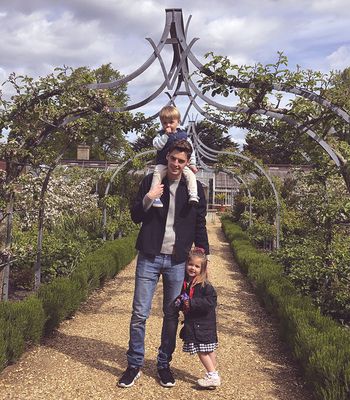
I love discovering who my children are. I’m sure all parents think this, but both of mine are such good company – especially when it’s just the two of us. One-on-one time should be cherished. Their imaginations are incredible, as is their infectious enthusiasm.
My husband is the fun one and I’m the disciplinarian. Luckily, neither of my children seem to take this dichotomy that seriously; they often find me most amusing when I least want them to. I’m super firm on good manners, though, and I spend a lot of time reminding them to make eye contact – especially when they’re apologising. Even so, when they’re older, I want to be the first person they call for help.
It is possible to have a happy home life and a fulfilling career. But I’m aware there are only a finite number of hours in the day, so something has to give. For me, that’s socialising. I don’t see my friends or even my family as much as I’d like, but that’s the trade-off. I love the idea that there should be three parts to everyone’s day: a third for work, a third for play and a third for sleep. That’s the kind of balance I’m still working on – especially as I’m starting my new business alongside my journalism career. It’s my first endeavour, so there’s a serious amount to wrap my head around and, as it’s just me, there are plenty of late nights.
Having a supportive partner is key when it comes to balancing work and motherhood. My husband has always done half the parenting, and at times more. During the incapacitating bouts of PND, my husband truly showed up for me. The only thing he’s not allowed to do is our daughter’s hair in the mornings – his braiding game is pretty weak.
I still talk to my own mother all the time. It’s obviously nowhere near the same as having her here, but I also work really hard at remembering all of who my sister and mother were, not just the wonderful parts. I always promised myself that to canonise them would be a disservice to the complex and wonderful people they were. Last year was a milestone I never wanted to reach – celebrating what should have been my sister’s 30th birthday. She died when she was 15, so it meant I’d lived as long without her as I had with her. What could have been a truly dark day was spent at the River Café, one of my all-time favourite restaurants, with our family and some of her closest friends. We were there telling stories and laughing until the lights came up.
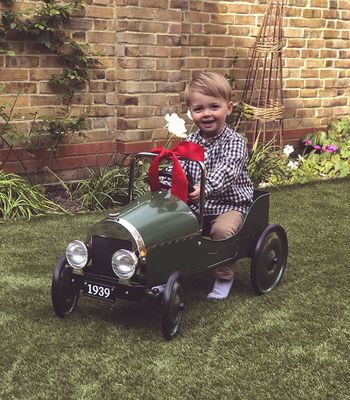
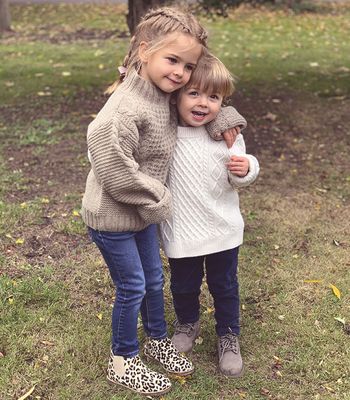
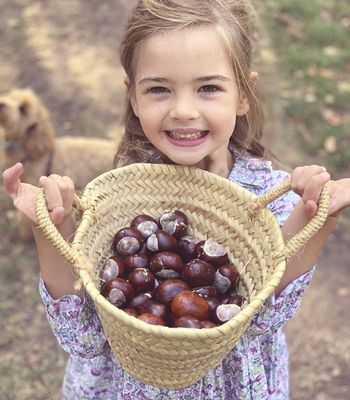
My mother taught me you can’t have fun on the sidelines. She also had the most wonderful laugh and found joy almost everywhere she went. She taught me that, regardless of talent, life was about getting stuck in. Whether it was taking up tennis in her 40s or learning to sail even after many, many summers spent in an adults’ beginner class, she took part in everything with a smile.
It sounds odd but I wish I’d known how permanent motherhood is. When I became a parent, it took days to register that, until the day I drew my last breath, I was going to be their mother. It wouldn’t matter how old they were, where they lived or whether they needed me, the responsibility never ends. Even though I’d been pregnant for nine months, nothing prepared me for this realisation.
The one piece of advice I would give first-time mums is to ask for help. Not everything about motherhood is enjoyable – in fact, a great proportion of it revolves around bodily fluids and mundane tasks. Some of it will also be terrifying, but you are not alone. Even if you’re doing this solo, or living in another country to your family, there is help available: other mothers, friends, friends of friends, apps, health workers, you name it. Be brave and ask for it.
This month Alice launched Memo, making personalised, hand-finished stationery and greetings cards. Made in the UK, everything is recyclable and plastic free.
Visit MemoPress.co.uk
DISCLAIMER: We endeavour to always credit the correct original source of every image we use. If you think a credit may be incorrect, please contact us at info@sheerluxe.com.


